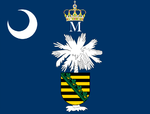Kingdom of South Carolina
Kingdom of South Carolina | |||||||||
|---|---|---|---|---|---|---|---|---|---|
|
Flag | |||||||||
| Motto: Providentae Memor | |||||||||
 | |||||||||
| Capital | Myrtle Beach | ||||||||
| Largest city | Columbia | ||||||||
| Official languages | English German | ||||||||
| Demonym(s) | South Carolinian | ||||||||
| Government | Constitutional Monarchy | ||||||||
| Legislature | Landstag | ||||||||
| Establishment | January 18, 2009 | ||||||||
| Population | |||||||||
• Census | 100 | ||||||||
| Currency | United States dollar $ | ||||||||
| Time zone | Eastern: UTC-5/-4 | ||||||||
| |||||||||
All information are claims by the Government of South Carolina at that time. | |||||||||
The Kingdom of South Carolina (German: Königreich Südkarolina), lasting between January 2009 and August 2010, was an independent member state of the U.E.N.A. as well as New Europe. Its capital was the city of Myrtle Beach, and its modern successor state is considered the County of Aiken.
History
Becoming part of New Europe
South Carolina became a member state in the final days of the U.E.N.A. Matthew I was designated state despot to forge his state as he saw fit. Matthew was crowned King by the citizens of South Carolina and it was approved by the Emperor. South Carolina took much pride in its local militia force, which was considered to be as well trained as a regular force, it was so well organized that most customs used in the Imperial Army today are based off of the South Carolina Militia's own.
In its founding days, the Imperial Army only had a unified command. However the regional states still maintained their own armed forces. The Royal South Carolinian Army had three component units. These were the Royal South Carolinian Leibgrenadiergarde, The Royal South Carolinian Garde zu Fuss Regiment, and the Royal Saxon Garde du Corps. These units had between 25-30 members at their appex.
Imperial Frontier
South Carolina, although a constituent state to the greater empire it served, had ambitions of its own. King Matthais boasted his military and royal prowess that he was made the first General Field Marshal for the entire military. As the chief military advisor as well as ruler of the most populated state in the empire the King convinced the Imperial Government to be firm against the Scientopian ultimatum which ultimately lead to the Meissner-Antifan War. It was also throughout the war that the South Carolinian government took majority in making military decisions seeing as it had the most soldiers under its command. The King sought a quick military victory against the enemies and endoresed Johannus von Ikner's plan to create a cyber warfare devision to combat Scientopia.
